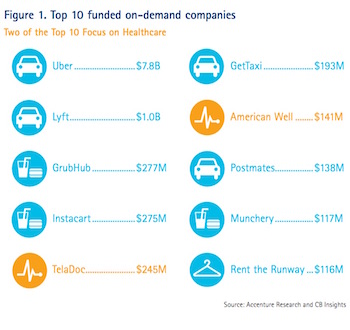 Investment in on-demand healthcare companies, like video visits with doctors, is expected to total $1 billion by the end of 2017, up from $200 million in 2014, according to Accenture.
Investment in on-demand healthcare companies, like video visits with doctors, is expected to total $1 billion by the end of 2017, up from $200 million in 2014, according to Accenture.
“On-demand healthcare is fundamentally changing – and enriching – the doctor-patient relationship, making the physician much more accessible to patients while simultaneously reducing costs,” Kaveh Safavi, senior managing director for Accenture's global health business, said in a statement. “With no end to this type of investment in sight, there’s an enormous opportunity for companies to offer fast, convenient and customized user-experiences that ultimately improve the patient experience and outcomes.”
The consulting firm analyzed investment data from on-demand healthcare companies between 2010 and September 2015 for this report. According to the company, Accenture only looked at early-stage, digital-first businesses that “through connected devices offer closed-loop, human-delivered experiences to the consumer in near real time”.
Across all sectors — including transportation, food and drink, health, household chores, logistics, and professional — 230 on-demand companies have raised $12.5 billion. Health-focused on-demand companies make up 6 percent of that total funding and are the third largest segment after transportation companies, which raised 76 percent the of total funding as well as food and drink companies, which raised 10 percent of total funding.
Two healthcare companies made it into the top 10 on-demand companies with the most funding. Teladoc came in fifth with $245 million in funding and American Will came in seventh with $141 million in funding. Overall, Uber received the most funding, $7.8 billion, followed by Lyft with $1 billion, GrubHub with $277 million, and Instacart with $275 million.
After Accenture took out the larger, outlier funding rounds, like those from Uber and Lyft, health-focused on-demand companies represent about 20 percent of the total funding. The number of health-focused companies have grown significantly in the last few years, from four companies in 2010 to 42 in 2014.
The most funding for health-focused on-demand companies, $639 million, came from what Accenture labels as primary care offerings. For example, funding in this category went into video visit services that put patients in touch with a board-certified physician. Companies that exclusively offer online behavioral health and therapy brought in $19 million and about $15 million was invested in companies focused on or companies that connect patients with a specialist, like a dermatologist.
Some of the reasons funding will quadruple between 2014 and 2017, Accenture explained, are government changes, like payers reimbursing for virtual visits; the growing number of people in the US that own smartphones and other mobile devices; and the adoption of digital health tools by older generations.














